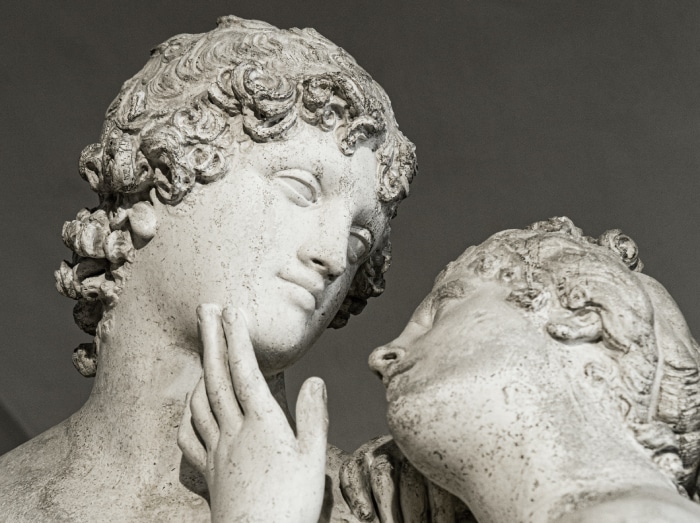Greece is one of the unique places with its mythological history, pleasing streets, warm people and delicious food, which visually satisfies our souls. It always arouses curiosity with its language and historical texture. In terms of the appearance of Greek letters Although it may seem incomprehensible, it is actually a pleasant language that leaves a sweet sound in the ear. Moreover, Greek and Greek words are very rich in terms of expressions and meanings. It is one of the oldest languages in the Indo-European family. If we look at its history, it has a rich and varied history with its writing system inspired by the Phoenician alphabet. The history of the Greek language spans more than 2,000 years and various periods, from the Archaic Period (900-600 BC) to the Hellenistic Period (323-30 BC), but its written tradition dates back to the 1st century BC. It begins with epic poetry at the beginning of the millennium.
One of the most fascinating things about the Greek language is its ancient roots. The Greeks have been speaking a unique language for over 3000 years! As we all know, alphabets were used in Ancient Greece and were taken as a part of cultural heritage by many countries colonized by the Greeks. Fortunately, being influenced by other languages does not change one’s roots; it just makes them stronger.
The dialect of Greece is a very poetic dialect. It has a soothing voice that makes it easy to learn and can be memorized effortlessly. Unlike other languages, Greek makes use of visual images in the meaning of words. So besides their true meaning, certain features such as colours, sounds and causes make them unique. Greek has been spoken for over three and a half thousand years, making it the oldest of the Indo-European languages – hence its nickname “the mother of western languages”. Only 13.5 million people speak Greek as their mother tongue, but the global impact is huge. Most of the major foundational texts in Western philosophy – think Plato and Aristotle. And Greek is the foundation of grammar and syntax rules, as well as words and phrases in languages spoken around the world, so don’t be surprised if some of these words sound familiar to you.
We have compiled the meanings of some of the most beautiful words in modern Greek for you. Here are some beautiful Greek words that will make you wonder what I’m waiting for to discover the history of this poetic language and its effects on languages in the world. Happy reading…
1) Charmolypi | χαρμολύπη
The first word in our list of Greek words is charmolypi. The expression Charmolipi etymologically refers to the word “joy and sorrow”. It is basically a compound word consisting of the terms joy and grief or sadness. It’s hard to translate, but conveys the idea of bittersweetness and having mixed feelings about something. It is more practical to say that chrematoli can be written as Chara (joy) or Molos (sadness). The word Charmolipi cannot be translated exactly but still it is wonderful and full of meaning. Composed of two Greek terms, one for joy and the other for grief, charmolipi encompasses all of what life means. After all, isn’t it a stunning mix of joy and sorrow?
2) Elpida | ελπίδα
This beautiful word has an equally wonderful meaning. Derived from the word Elpis, Elpida means hope. In Greek mythology, Elpis was considered the spirit and embodiment of hope, and was usually represented by a young woman bearing fertility. Elpida comes from the ancient Greek word ἐλπίς (elpis) and is the personification and spirit of hope in Greek mythology, often depicted as a young woman bearing flowers or fertility. Today, Elpida is actually a popular name for women.
3) Ygeia | ὑγίεια
Today’s medical care has its roots in ancient Greece. The word Ygeia extends from these roots to the present day. The word associated with Hygieia, the goddess of health and cleanliness, is derived from the word “hygiene”. Before it became colloquial, the Modern Greek phrase “Geia sou or Geia sas”—meaning “your health”—was used to wish someone well. Ygeia is also part of the Greek greeting Yia Sou, which is a wish for health.
4) Philoxenia | φιλοξενία
We’re sure you’ve heard how hospitable the Greeks are. But did you know that this hospitality dates back to ancient Greece? True, the ancestors of the Greeks thought that Zeus sent strangers on their way and they had a moral obligation to offer everything they could to outsiders, who were considered holy persons. Okay, maybe your hotel owner or a stranger you ask for directions on the street won’t consider you exactly holy today, but they will definitely be really friendly to you and treat you like a guest of their country. Also, the word they use to describe their hospitality is the same as the Greeks used in antiquity: “filoxenia”[filokseniːa] , literally being friends with strangers.
5) Kalon | καλόν
The word kalon means beautiful in Greek. It does not only express the visible beauty, but also expresses the invisible beauty by looking at the skin. It is used to describe someone who is not only outwardly great, but also has noble intentions and an honorable character. Greek words fascinate us all with the meanings of their roots as they reach our days, right?
6) Filia | φιλία
Many languages use a word meaning “kisses” and “filia” as their tradition of saying goodbye.[filiaː] This is exactly what it means in Greek. Contrary to what you might imagine, it doesn’t usually mean intimacy, although it’s obvious that you’d just call someone you know pretty well “filia”, whether when you’re leaving or before you hang up. The “sweeter” version is “filakia” (literally little kisses) in which younger women sing more often. The Greek word for “kiss” is “friendship”[filiːa] You also need to make sure you don’t confuse it with
7) Curiosity | µεράκι
This word is one of the most difficult to translate; Doing something out of curiosity means adding “a piece of your soul” to what you do. The root of this term is curiosity, which means doing something with pleasure or “labor of love” in Turkish. In usage, this word expresses a passion, an absolute devotion. When you do something with Meraki, you put your soul into it. Surprisingly, this widely used modern Greek word comes across as the term “curiosity” in Turkish. Well, curiosity breeds passion, and passion breeds labor and love. Doesn’t the thought in Turkish sound great to you too?
8) Peratzatha | Περατζάδα
“peratzatha”, one of many words that can tell you something about Greek culture[peratzaːða] refers to the idle but extremely relaxing activity of people watching. Many Greeks consider this one of the most fun things to do in life, so if you’ve been to Greece before, you’ve probably noticed that many Athenian bars and cafes have tables outside. This is to take advantage of the gorgeous weather that Greece is proud of, of course, but also because there’s something strangely hypnotic about watching people pass by while you sip your coffee or drink. So, if an authentic travel experience of Greece is what you are looking for, we have not only taught you a really great Greek vocabulary, but also a very Greek alternative to the local activities that most local city tours require.
9) Eudaimonia | ευδαιμονία
This word is formed from the root eu meaning good and tyhi meaning “luck”. It can also be translated as “contentment,” which some might say is the most genuine and most consistent form of happiness. Also spelled as Eudaemonia, the term refers to the state of being happy, healthy, and prosperous. Simply put, it means the state in which a person truly develops. We have to thank Aristotle for this term – a single term that effortlessly explains something so broad and profound.
10) Aionia | αιώνια
The word comes from the ancient Greek term aion, meaning “age,” and gives English an indefinite but long period of time, aeon, or describes a large part of geological time. In astronomy and less formal contexts, an aeon denotes a time span of one billion years, while its full Turkish equivalent is infinity.
11) Paracosm | παρακοσμικος
Paracosm comes from the ancient Greek words παρά (pará, ‘beside’, ‘beside’) and κόσμος (kósmos, ‘earth’, ‘universe’). The dictionary meaning of this word, also known as parakosmikos, can be defined as extraterrestrial. Together, these two expressions form the paracosm, an elaborate fantasy world woven especially by children. It is so fascinating that there is a separate Greek word for this wonderful thing that children do!
12) Agapi | Aγάπη
With ancient Greek words, love is defined by many different words. Agapi is considered the highest form of love – the love of two partners for each other, the love that unites parents and their children, or even people’s love for God and vice versa. The term erotas (έρωτας) in modern Greek words means sincere love of a more romantic or sexual nature, while filia (φιλία) means love and friendship. It can be thought of how it differs from agapi in terms of meaning. What sets Agapi apart from others is that she is the purest form of love. Agapi or a-ga-pee is one of many beautiful Greek words for love.
13) Kairos | καιρός
Closely related to the Greek word for time, chronos, kairos is the acknowledgment of a special moment in less than a measure of hours and years. It is the idea of the perfect moment, ripe for action. Kairos is the right moment, at the right time and in the right place, creating the perfect atmosphere for everything to fall into place effortlessly. While the English term serendipity is a fortunate development, Kairos capitalizes on coincidence. Isn’t it fascinating how everything is connected!
14) Yia Mas | Για εμάς
As you can probably guess, “yia mas”[jaː mas] It is also a wish for health, but this time it is ours. Unlike yia soun, “yia mas” is not a greeting, but the standard toast we Greeks do before sipping a glass of alcohol in hand. So if you’re planning to explore the world-famous Athens nightlife, this is a phrase you’ll likely hear a lot. If someone offers you a toast saying “yia mas”, respond and enjoy. Pretty easy, right? You’ll enjoy Athens’ nightlife and bar hopping – and you’ll probably hear and sing about Yia Mas over and over!
15) Philoteimos | φιλότιμο
Another difficult-to-translate word is filotimo, which encompasses a number of virtues: honor, dedication, duty, courage, pride, and honesty. Filotimo, meaning “friend of honor” or “love of honor”, refers to the once honorable and virtuous, even if it is not in his own interest. Although long counted among the highest of Greek virtues, it carried negative connotations in early writings.
16) Chalara | χαλαρά
In its most general sense, halara means “keep calm”. When looking at the dictionary meaning, it means to relax, to relax. Often associated with the northern Greek city of Thessaloniki – known for its chilly atmosphere compared to Athens – chalara denotes a way of life meaning “relaxed” and “relaxed”.
17) Nostalgia | Νοσταλγία
Nostalgia is one of the Greek words derived from nostos meaning returning home and algos meaning pain of something.
The meaning it gives is a combination of nostos, which means returning home, and algos, which means a dull pain, longing. Together, they create nostalgia, which refers to a deep nostalgia or sad love for the past—especially when talking about or commemorating something that was had but no longer has. Oh nostalgia!
18) Petricho | πετρίκο
We continue our list of Greek words with a very familiar word that has been adopted in every language: petríko. It means the smell of earth where the first drop of rain touches it. Close your eyes and imagine that the rain has just started. When the first drops of rain hit the dry ground, an earthy scent comes to your senses – does it sound familiar? This wonderful earthy aroma is called petrichor and is composed of the Greek word for stone, petra, and īchōr, the blood of the mythological Greek gods. It refers to the pleasant earthy smell produced when it rains on dry ground, especially after a long period of drought. The word comes from the Greek words petra (stone) and īchōr (blood of the Greek gods).
19) Eleftheria | Ελευθερία
Eleftheria, meaning “freedom”, specifically refers to the state of being freed from slavery. In essence, Eleftheria is gentle and pleasant; He is free-spirited and cannot be easily crushed. He doesn’t appreciate people with limited minds and attitudes. You can see this word in the Greek national slogan – Eleftheria i thanatos (Liberty or death) which is the subject of the songs of the Greek resistance against Ottoman rule.
20) Philocalist | Φιλοκαλιστ
Philokalist or Philocalist is a Greek term used to describe a person who is able to see beauty in everything. The philologist is essentially a lover of beauty, someone who appreciates the beauty of the little things that make life worthwhile. It may not be a person found beautiful, but a tree, building or landscape. In short, this term tells us that we are in love with everything that looks beautiful. Wonderful!
21) Eucharist | Ευχαριστω
The eucharist is a Greek word meaning ‘thank you’. Efharisto is a word you can use when you sincerely want to express your gratitude and appreciation for what has been given. If you’re traveling to Greece and just need to learn a word, let this be it. This will open up new conversations with the locals and let them know that you are enjoying all the philoxenia the Greeks shower on you!
22) Calimera | Καλημέρα
“Calimera”[kalimeːra] another super useful and beautiful greek word. This is probably the clearest word we know of Greek. Kalimera literally means “have a nice day”. Technically, you have to use it until 12:00, after that “kalispera”[kalispeːra] – so it is preferable to say “have a nice day”. This distinction can be thought of as the difference between the English Good Morning and Good Afternoon. Both words are fairly easy to pronounce, so if you’re looking to impress your Athens tour guide or the Greek restaurant owner you just met, throwing a casual ‘kalimera’ or ‘kalispera’ into the conversation will likely get you patted on the back.
23) Ataraxia | Aταραξία
The literal translation of Ataraxia is a state of calm calm. But the literal translation of the Greek word ataraxia is indifference. Its usage is used to express a state of ultimate freedom in which the mind is freed from the shackles of emotional disturbances such as stress and anxiety. Oh, dream!
24) Parakalo | παρακαλο
The response to the Eucharist, parakalo, is the modern Greek word for “welcome”. But that’s not all! The Greeks like to attach several meanings to a single term. So parakalo means please along with the meaning of welcome. Between the eucharist and the parakalo, you can now say thank you, welcome and please – the holy trinity of a polite tourist!
25) Empyrean | Ουράνιος
Yes, we have come to the end of our list of Greek words. We chose a great word for closing: Empyrean. It takes its origin from the modern Greek word empyros, which is on fire or burning. Its use comes from the Ancient Greek cosmology, the highest place in heaven called Empyrean. Although it is defined as heaven in the most basic sense, it is also referred to as the highest point of the sky, the sky dome in some sources. The term itself evokes a cosmic emotion, doesn’t it?
26)Philosophia | Φιλοσοφία
Philosophy” comes from the Greek word “philosophia,” which means “love of wisdom.” This word is derived from the combination of “philo,” meaning “love,” and “sophia,” meaning “wisdom.”
27)Theoria | Θεωρία
“Theory” comes from the Greek word “theoria,” which means “contemplation” or “a looking at.” This word is derived from the combination of “thea,” meaning “a viewing,” and “horao,” meaning “to gaze at.”
28)Klinike | Κλινική
“Clinic” comes from the Greek word “klinike,” which means “bed” or “infirmary.” This word is derived from the root “kline,” meaning “bed,” which is also the origin of the English word “incline.”
29)Krisis | Κρίσις
“Crisis” comes from the Greek word “krisis,” which means “decision” or “judgment.” This word is derived from the root “krin,” meaning “to separate” or “to decide.”
30)Khaos
“Chaos” comes from the Greek word “khaos,” which means “void” or “emptiness.” This word is derived from the root “kha,” which means “to gape” or “to be wide open.”
31)Kosmos | Κόσμος
“Cosmos” comes from the Greek word “kosmos,” which means “order” or “harmony.” This word is derived from the root “kosm,” meaning “to order” or “to arrange.”
32)Ekleipsis | Εκλειψις
“Eclipse” comes from the Greek word “ekleipsis,” which means “an abandonment” or “a failure to appear.” This word is derived from the combination of “ek,” meaning “out of,” and “leip,” meaning “to leave.”
33)Heureka
“Eureka” comes from the Greek exclamation “heureka,” which means “I have found it!” This word is derived from the combination of “eu,” meaning “well,” and “heurisk,” meaning “to find.”
34)Hyperbole | Υπερβολή
“Hyperbole” comes from the Greek word “hyperbole,” which means “excess” or “overstatement.” This word is derived from the combination of “hyper,” meaning “over,” and “bole,” meaning “to throw.”
35)Odysseia | Οδύσσεια
“Odyssey” comes from the Greek word “odysseia”





















